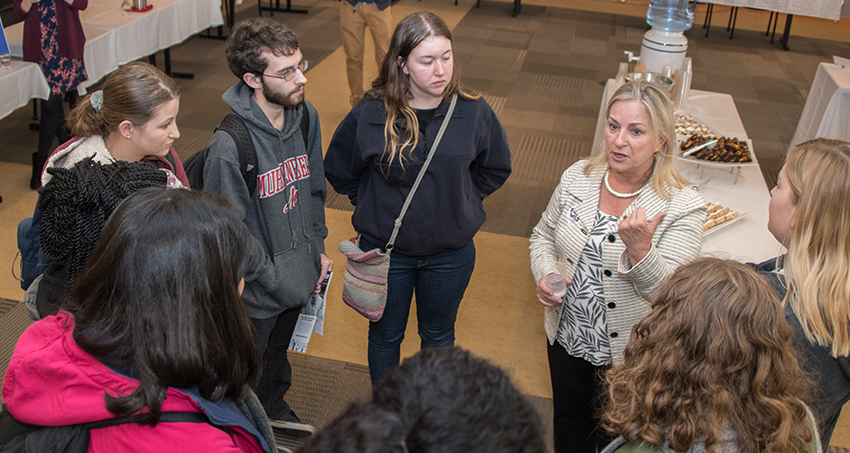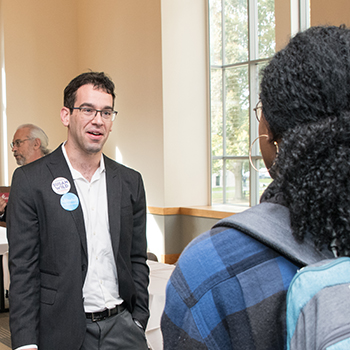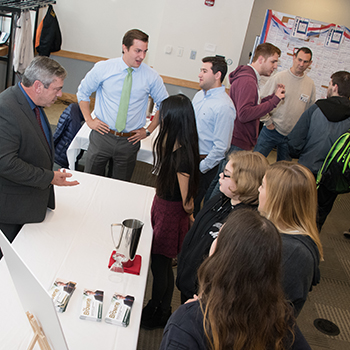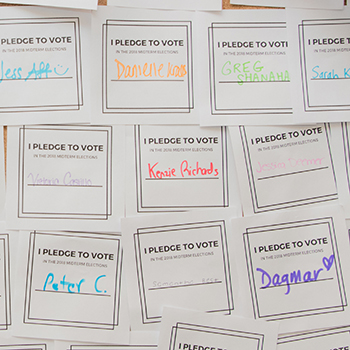Election Day at Muhlenberg
Muhlenberg students can vote in Seegers Union, and two connected nonpartisan groups at the College are working to ensure they take advantage of this privilege.By: Meghan Kita Tuesday, November 6, 2018 08:28 AM
 Above, Susan Wild, candidate for United States Representative in Pennsylvania's 7th District, talks with students at a Meet the Ticket event in late October. Pennsylvania Representative Mike Schlossberg '05 (below), as well as Pennsylvania Senator Pat Browne and his opponent Mark Pinsley (further below), also attended the event.
Above, Susan Wild, candidate for United States Representative in Pennsylvania's 7th District, talks with students at a Meet the Ticket event in late October. Pennsylvania Representative Mike Schlossberg '05 (below), as well as Pennsylvania Senator Pat Browne and his opponent Mark Pinsley (further below), also attended the event. If you had to walk past your polling place in order to eat breakfast, would you be more likely to vote? What if you could see the voting machines as you waited in line for your morning coffee?
If you had to walk past your polling place in order to eat breakfast, would you be more likely to vote? What if you could see the voting machines as you waited in line for your morning coffee?
Muhlenberg students who registered to vote using their on-campus address have this luxury. The polling place for the precinct that includes the College is inside Seegers Union, so hungry or under-caffeinated students heading to Wood Dining Commons or Java Joe can do their civic duty along the way.
It wasn’t always like this, recalls Professor of Political Science Michele Deegan. “Turnout for 2008 was bonkers,” she says, and at that time, students had to vote at William Allen High School with voters from another precinct. There was a six-hour wait to vote, and that was after a mile-long journey to the school.
For the primaries the following spring, the precinct’s polling location moved to Seegers Union. The Political Science Department credits former Vice President of External Affairs and Community Affairs Mike Bruckner for the change; Bruckner says he thinks someone from the Political Science Department led the charge. However, both he and Deegan agree that Muhlenberg’s history of involvement in local elections—with fluent Spanish students serving as interpreters and other students serving as poll workers—likely established a good relationship with the officials who needed to be on board with the change.
Encouraging Student Engagement
 Still, for years, College-wide surveys found low levels of voter engagement and turnout, even lower than those of other institutions.
Still, for years, College-wide surveys found low levels of voter engagement and turnout, even lower than those of other institutions.
“I just thought, ‘We’ve got to do better than this,’” Deegan says. “I did a quick literature review over a couple days to find out how we can increase turnout among this age group and got ideas for some things we might do on campus.”
She took those ideas to Beth Halpern, director of the Office of Community Engagement, who had had several conversations with Deegan about low engagement over the years. Halpern reached out to student leaders from the College Democrats and Republicans, as well as from groups interested in social issues, and organized a meeting for early 2016. The timing was right, and out of that meeting came BergVotes, a nonpartisan student organization focused on increasing voter registration and turnout and the level of political dialogue on campus.
When Halpern, Taylor Chase ’19, president of BergVotes, and Sara Levene ’21 attended a conference at Franklin & Marshall College last year, they found a model that involves more people: F&M’s nonpartisan, engagement-focused group includes students, faculty and staff, which helps with continuity as students graduate and allows the entire community to mobilize in support of civic participation.
In response, the students requested a change, and Deegan and Halpern collaborated with them to create a second group, the BergVotes Collective, which allows faculty and staff to work in tandem with BergVotes. The Collective includes faculty from the Political Science, Physics, Biology and Languages Departments and staff from the Community Engagement, Advancement, Multicultural Life and Housing and Residence Life Offices.
“It's been really nice to embrace the idea that it's the responsibility of all of us to educate our students about the importance of voting and political engagement,” Deegan says.
Taking Action
But what does that look like in practice? Deegan’s review found that peer-to-peer conversations are the most effective way to boost engagement in young voters, and BergVotes helps facilitate those. For example, the group has hosted several roundtables (including one last month on the increase in female candidates) and events (including an Issues Expo, at which representatives from student organizations tabled about policy matters relevant to their clubs’ missions) this semester.
 A common excuse Halpern has heard from students who don’t vote is “I just don’t know enough.” To combat that, BergVotes (along with the College Democrats and Republicans) invited local candidates to campus for a Meet the Ticket event (pictured above) on October 26.
A common excuse Halpern has heard from students who don’t vote is “I just don’t know enough.” To combat that, BergVotes (along with the College Democrats and Republicans) invited local candidates to campus for a Meet the Ticket event (pictured above) on October 26.
“In an academic environment, students are accustomed to doing hoursof research, citing their sources and addressing big questions. Students feel like, ‘I didn’t do the research thoroughly enough, so I shouldn’t vote,'” Halpern says. “I think the only thing you can regret is not doing anything. By doing nothing, you’re also doing something. If everyone at this College voted, we would have a huge say in what happens in local politics.”
BergVotes and the Collective have worked together to try to make that happen: to get community members registered before Pennsylvania’s deadline and to secure pledges (pictured) to vote on Election Day, a literature-backed strategy to increase turnout.
Chase, a political science and sociology major, says her involvement has helped her cultivate the ability to “approach things in a nonpartisan way, which is really hard for a lot of people. This has taught me how to focus more on civic engagement and voter education rather than single issues, which is what I usually do.”
